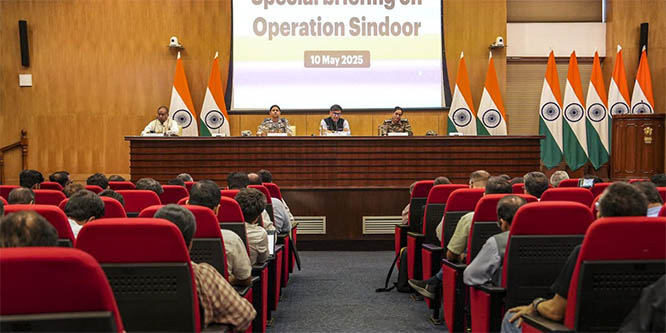
The puja will continue in the southern cellar of the Gyanvapi mosque in Varanasi, the Allahabad High Court said on Monday, February 26 while dismissing an appeal that had challenged the district court's order to this effect.
Justice Rohit Ranjan Agarwal dismissed the mosque management committee's appeal that had challenged the Varanasi district court's order allowing "puja" to be performed in the "Vyas Tehkhana" or southern cellar of the mosque.
The high court dismissed two appeals filed by the Anjuman Intezamia Mosque Committee challenging the district judge's January 17 order that appointed the district magistrate as the receiver of the "Vyas Tehkhana" and January 31 order by which he allowed "puja" to be performed there.
The high court said worship in the "Vyas Tehkhana" will continue.
Dismissing the appeals, Justice Agarwal said, "After going through the entire records of the case and considering the arguments of the parties concerned, the court did not find any ground to interfere in the judgment passed by the district judge on January 17, appointing the Varanasi district magistrate as the receiver of the property, as well as the order dated January 31 by which the district court permitted puja in the tehkhana."
The high court judge had reserved his verdict in the matter on February 15 after hearing the counsel for the parties.
The Anjuman Intezamia Mosque Committee manages the affairs of the Gyanvapi mosque. It moved the high court on February 2, hours after the Supreme Court refused to hear its plea against the district court order and asked it to approach the high court.
The district court ruled on January 31 that a Hindu priest can perform prayers before the idols in the southern cellar of the mosque.
The prayers are now being conducted by a "pujari" nominated by the Kashi Vishwanath temple trust and the petitioner, who has claimed that his grandfather offered puja in the cellar till December 1993.
The district court had directed the local administration to make arrangements within seven days for prayers in the cellar. This would have involved "proper arrangements" with metal barricades at the complex.
A Sangh Parivar-backed survey conducted by the Archaeological Survey of India (ASI) on the court's order had claimed that the mosque was constructed during Mughal emperor Aurangzeb's rule over the remains of a Hindu temple.
The January 31 order was delivered on the plea of Shailendra Kumar Pathak, who had claimed that his maternal grandfather, priest Somnath Vyas, offered prayers in the cellar till December 1993.
He had said the "puja" was stopped during the tenure of then Uttar Pradesh chief minister Mulayam Singh Yadav after the Babri masjid in Ayodhya was demolished on December 6, 1992.
During the hearing, the Muslim side to the dispute had contested the petitioner's version. It had said no idols existed in the cellar and hence, there was no question of prayers being offered there till 1993.
The Muslim side had also countered the petitioner's claim that the basement was under his grandfather's control.
The petitioner had claimed that his family had the control of the cellar even during the British rule.
In an earlier order on January 17, the Varanasi court had directed the district magistrate to take charge of the cellar, but not given any directions then on the right to offer prayers there.







Comments
Add new comment